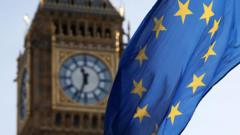As global tensions reshape priorities, the UK and EU approach their inaugural bilateral summit since Brexit, aiming to rekindle cooperation amid ongoing geopolitical challenges. Authorities signal a cautious optimism as they navigate complex negotiations over economic ties, security agreements, and ongoing disputes.
UK and EU Navigate New Era of Cooperation Ahead of Landmark Summit

UK and EU Navigate New Era of Cooperation Ahead of Landmark Summit
The first UK-EU summit after Brexit marks a pivotal opportunity for renewed collaboration in areas like trade, defence, and immigration policy.
The UK and EU are set to converge in London on Monday for their first bilateral summit since Brexit, signaling a significant step in re-establishing relationships fractured by the separation. While officials temper expectations for sweeping breakthroughs, the underlying sentiment expresses a desire for cooperation, largely driven by the evolving global landscape marked by concerns about Russia and China, and the fallout from the Trump administration's foreign policy.
The ongoing war in Ukraine and the urgency of reassessing European security strategies have catalyzed this shift as both parties recognize the necessity of collaboration. Anand Menon, director of the think tank UK in a Changing Europe, emphasizes that facing today's international challenges necessitates a united front, even among historically divergent nations.
As anticipation builds around the summit, the UK’s invitation to French President Emmanuel Macron for a state visit ahead of the meeting reflects an effort to improve relations. Analysts suggest this is a strategic move by the UK to ease tensions, particularly given France's pivotal role in negotiations. French interests, such as fishing rights and access to defence contracts, are still under scrutiny, prompting expectations of contentious discussions.
Observers anticipate the summit will yield three coordinated announcements, addressing shared foreign policy interests, formulating a defence and security agreement, and implementing trade measures aimed at reducing post-Brexit barriers. Although Prime Minister Sir Keir Starmer’s administration has pledged to reset ties with the EU, it faces significant limitations, particularly around customs union and single market negotiations, which complicate economic ambitions.
The proposed sector-by-sector approach aims to alleviate trade issues, notably through a plant and animal health deal. While this could facilitate smoother trade, it may also necessitate compliance with EU regulations, provoking backlash among staunch Brexit supporters domestically.
In addition, negotiations include a potential youth mobility scheme intended to promote cross-border opportunities for young people, alongside efforts to address illegal migration and streamline energy trading. Trade relations with the EU remain essential, as exports account for a significant portion of the UK’s economic landscape.
On the defence front, the UK aspires to enhance cooperation through a security pact, aiming to secure access to EU defence contracts amid the backdrop of increasing demands for military readiness across Europe. Nonetheless, the ongoing tension between member states, especially concerning market openness and the prioritization of domestic defence industries, poses challenges to achieving shared goals.
As the summit unfolds, the intricate web of negotiations highlights the complexities of rebuilding a partnership, balancing national interests against the necessity of collaboration in an uncertain global environment. The outcomes of the summit could set a new trajectory for UK-EU relations, but the road ahead remains laden with challenges and compromises.
The ongoing war in Ukraine and the urgency of reassessing European security strategies have catalyzed this shift as both parties recognize the necessity of collaboration. Anand Menon, director of the think tank UK in a Changing Europe, emphasizes that facing today's international challenges necessitates a united front, even among historically divergent nations.
As anticipation builds around the summit, the UK’s invitation to French President Emmanuel Macron for a state visit ahead of the meeting reflects an effort to improve relations. Analysts suggest this is a strategic move by the UK to ease tensions, particularly given France's pivotal role in negotiations. French interests, such as fishing rights and access to defence contracts, are still under scrutiny, prompting expectations of contentious discussions.
Observers anticipate the summit will yield three coordinated announcements, addressing shared foreign policy interests, formulating a defence and security agreement, and implementing trade measures aimed at reducing post-Brexit barriers. Although Prime Minister Sir Keir Starmer’s administration has pledged to reset ties with the EU, it faces significant limitations, particularly around customs union and single market negotiations, which complicate economic ambitions.
The proposed sector-by-sector approach aims to alleviate trade issues, notably through a plant and animal health deal. While this could facilitate smoother trade, it may also necessitate compliance with EU regulations, provoking backlash among staunch Brexit supporters domestically.
In addition, negotiations include a potential youth mobility scheme intended to promote cross-border opportunities for young people, alongside efforts to address illegal migration and streamline energy trading. Trade relations with the EU remain essential, as exports account for a significant portion of the UK’s economic landscape.
On the defence front, the UK aspires to enhance cooperation through a security pact, aiming to secure access to EU defence contracts amid the backdrop of increasing demands for military readiness across Europe. Nonetheless, the ongoing tension between member states, especially concerning market openness and the prioritization of domestic defence industries, poses challenges to achieving shared goals.
As the summit unfolds, the intricate web of negotiations highlights the complexities of rebuilding a partnership, balancing national interests against the necessity of collaboration in an uncertain global environment. The outcomes of the summit could set a new trajectory for UK-EU relations, but the road ahead remains laden with challenges and compromises.



















